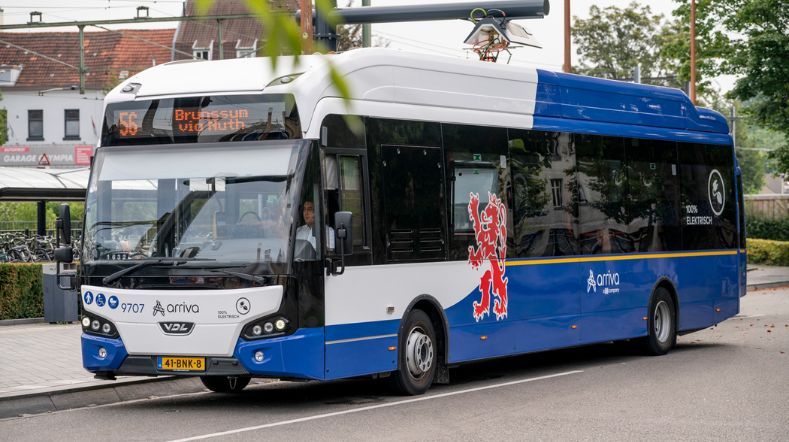
TNO to go climate-neutral by 2040
TNO is committed to sustainability thanks to smart innovations that help make our society climate-neutral. But TNO also takes responsibility for its own actions. How sustainable is TNO itself? We speak to the CSR Officer in charge of this.
From renewable energy in the buildings and reusing furniture to recycling waste and research materials, TNO aims to become climate-neutral by 2040. This can only be possible by being smart about leveraging in-house experts.
CSR Officer, Mathieu Baas says: 'Climate research shows that if we continue to pursue climate neutrality at the same pace as we do now, the Intergovernmental Panel on Climate Change (IPCC) target of 1.5°C will be exceeded. Last year, global temperatures climbed above this limit for the first time. So, we need to step up our efforts to reduce CO2.'
'Over the past year, TNO has made considerable strides. The CO2 emissions related to our operations ‒ also known as Scope 1 and 2 emissions ‒ decreased significantly. In 2023, the CO2 emissions of our business operations fell by 54% compared to 2019. Our natural gas consumption fell by 36% over the same period, while 89% of the total electricity we have used at TNO in recent years is now renewable. Our contains latest annual report a detailed explanation of this.'

'Climate research shows that if we all continue to pursue climate neutrality at the same pace as we do now, the Intergovernmental Panel on Climate Change (IPCC) target of 1.5°C will be exceeded.'
Making TNO offices sustainable
TNO has 20 sites and uses a lot of energy for research. Most locations already use green electricity (89% of the total) and TNO has committed to making its electricity use 100% sustainable by 2025.
TNO is systematically making its property portfolio and facilities more sustainable. Mathieu continues: 'A schedule has been drawn up for the entire portfolio, determining when each location will be made sustainable between now and 2040. That includes looking at what steps to take for leased locations. And if we can’t make a given location sustainable enough, we will look for another location.'
'Over the coming years, we will work harder on this by rolling out solar panels, making all lighting LED, and smartly optimising heating systems with AI. We are also investing in an innovative heat recovery wall at one of our locations, co-developed by TNO experts. Meanwhile, 588 MWh of renewable electricity is already being generated at TNO sites.'
And as employees on the shop floor are increasingly aware of how much energy their research and experiments consume, everyone has their own part to play in reducing TNO's emissions.

Some of the questions that TNO faces in its business operations and its own research
At what point should you replace research equipment with a more energy-efficient variant? The lower energy consumption saves on CO2, but producing new equipment actually causes more CO2 emissions. Where is the net positive tipping point? See our research proposition on this: Circular value creation
A sustainable business also means working differently. What does this mean for employees? How do you involve them in the transition? Do you opt for centralised control with a lot of instruction, or would you rather a highly delegated approach with autonomy on the shop floor? See our research on this: Social innovation
When it comes to renovation and new construction projects for high-tech labs such as cleanrooms, to what extent can you commit to material reuse and circularity without sacrificing performance? Our world-class research shows the demands are high. See our research on this: Circular and industrial construction
Did you know that the coffee we drink from the vending machines at TNO is sustainably produced? Plus, the cups we use are either circular or reusable.
Any leftovers from the company restaurants are put on the Too Good to Go app. We don’t completely replace furniture if we don’t need to, only the parts. Old furniture is also refurbished so it can be used like new again.
Sometimes, disposal is the only option, but we do so sustainably. Quirine Cohen, Consultant Circular Plastics, says: 'Separating your rubbish properly ensures that we can dispose of and recycle our industrial waste sustainably. Together with my colleague Veronique Barthelemy, I analysed waste from our offices. This showed that there is much to be gained in reducing our CO2 emissions if we reduce our residual waste and separate it better.'
'We have developed new information boards to make separating office waste easier. Since January 2024,these boards can be found at all TNO locations. We will do another analysis of the waste data after this year to assess the impact of this project.'
Sustainable labs
A bigger challenge lies in making TNO’s core business ‒ i.e. our research facilities ‒ more sustainable. How do we make sure they remain world-class and sustainable? We start with the big things and work down towards the little ones: Can we take steps in procurement for large research facilities and can things be done differently in operations when using plastic gloves or packaging?
Torsten Scheithauer, leader of the microbiology labs pilot project, explains: 'Our pilot project focuses on biological labs and consists of four phases. In phase 1, we take stock: we look at how much CO2 we emit and how much material is used in the lab.'
'In phase 2, we explore the potential measures. In what ways can we become more sustainable? Think of the 4 Rs: refuse, reduce, reuse, recycle. So, what can we stop using, use less of, reuse or make suitable for other uses in our laboratory environment? In this phase, we draw on our colleagues’ expertise and look at other companies to see how they do things.'
'In phase 3, we start actually testing to find out what works and what doesn’t. For example, we’ll lower the temperature of our freezers, use extractor hoods and see whether that saves energy. We will also try out alternatives to plastic packaging. In phase 4, we will finally see what lessons from this pilot project we can apply to the rest of the organisation.'

'Last year, TNO employees travelled 52 million business kilometres, resulting in total emissions of 6,473 tonnes of CO2. This has fallen by 60% per FTE since 2016.'
Sustainable commuting & business travel
TNO's latest Mobility Policy took effect on 1 January 2023. It is based on three pillars: flexibility, vitality, and sustainability. The policy helps employees be flexible when it comes to travelling for work. They can choose which means of transport to use for which part of their journey and be reimbursed for it. The policy also helps them make choices that support their vitality, by incentivising walking and cycling, for example. Finally, the policy intends to help TNO achieve its sustainability ambitions. If an employee wants to rent a car for personal use, they will get a subsidy from TNO if they opt for an electric vehicle.
Most TNO locations have charging facilities for bikes and cars. And more and more electric rental cars are becoming available for business travel. You will also find electric bikes at several locations.
And it’s clear the policy has been successful, says CSR Officer Mathieu Baas: 'Last year, TNO employees travelled 52 million business kilometres, resulting in total emissions of 6,473 tonnes of CO2. This has fallen by 60% per FTE since 2016. A substantial reduction that we owe to the Mobility Policy rolled out in 2023.'
But what isn’t going so well? Emissions from air travel did increase. The focus will remain on reducing these emissions where possible over the coming years. For example, TNO employees should only fly if it provides real value. For journeys with a distance of less than 700 km or less than 6 hours of travel time, they must opt for alternative transport, such as trains.
'There is still a lot of work to be done, but I’m confident we’ll achieve our ambition of a climate-neutral TNO. With the efforts of all our TNO experts, we will definitely succeed.'
Want to know more about TNO's sustainable results and ambitions? Read the latest annual report or get in touch with us.
Want to know more about TNO's CSR policy?
TNO has adopted a clear policy on Corporate Social Responsibility (CSR) to put its ambitions into practice in its operations.
Get inspired
Public trust in nuclear energy requires an adaptive policy approach


Unlock System Transitions

Thermoplastic composites


Health of electric bus batteries now measurable on-site via charger


Time setter story: Tobias Mooy on the TNO Traineeship


